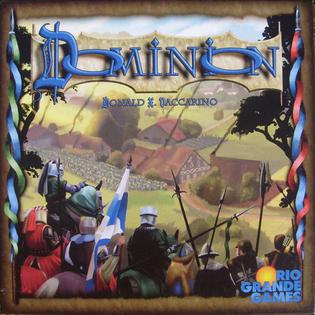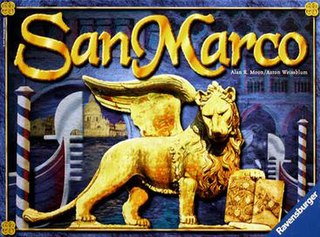
Reiner Knizia is a prolific German-style board game designer.

El Grande is a German-style board game for 2-5 players, designed by Wolfgang Kramer and Richard Ulrich, and published in 1995 by Hans im Glück in German, by Rio Grande Games in English, and by 999 Games in Dutch. The game board represents renaissance-era Spain where the nobility fight for control of the nine regions. El Grande was praised for its area-control mechanism, and was awarded the Spiel des Jahres prize and the Deutscher Spiele Preis in 1996. Following its release, several expansions and an alternative version were published.

Days of Wonder is a board game publisher founded in 2002 and owned by Asmodee Group since 2014. Days of Wonder distributes its games to 25 countries. It specializes in German-style board games and has branched out to include some online games. Days of Wonder has published games in several languages including English, Dutch, French, German, Russian, and Greek. Days of Wonder was co-founded by Eric Hautemont, Mark Kaufmann and Yann Corno.

Ticket to Ride is a railway-themed German-style board game designed by Alan R. Moon. It was illustrated by Julien Delval and Cyrille Daujean and published in 2004 by Days of Wonder. The game is also known as Zug um Zug (German), Les Aventuriers du Rail (French), Aventureros al Tren (Spanish), Wsiąść do pociągu (Polish), and Menolippu (Finnish).

Wolfgang Kramer is a German board game designer.

Queen Games is a German publisher of tabletop games, based in Troisdorf and founded in 1992 by head Rajive Gupta, which specialises primarily in German-style, family-level games but has also published smaller numbers of both simpler, children's games and more complex, gamers' games.

Caylus is a strategy oriented, German-style board game designed by William Attia and independently published in 2005 by Ystari in France and England, and Rio Grande Games in North America. Caylus has a mix of building, producing, planning, and bargaining — without direct conflict or dice-rolling mechanics.

The Princes of Florence is a German board game designed by Wolfgang Kramer and Richard Ulrich published in 2000 by Alea in German and by Rio Grande Games in English. Players assume the roles of Florentine Princes who wish to design their own villas to allow artists to create great works of prestige. Through seven rounds, each containing an auction phase and two action phases, the Princes pay for landscaping, buildings, freedoms, and various services and bonuses. At the end of the seven rounds, whoever has the most Prestige Points wins.

Michael Kiesling is a German board game designer. Many of his games have been nominated for or have won the Spiel des Jahres, a German games award.
Clans is a German-style board game designed by Leo Colovini. The game centers on the creation of villages.

Agricola is a Euro-style board game created by Uwe Rosenberg. It is a worker placement game with a focus on resource management. In Agricola, players are farmers who sow, plow the fields, collect wood, build stables, buy animals, expand their farms and feed their families. After 14 rounds players calculate their score based on the size and prosperity of the household.

Dominion is a card game created by Donald X. Vaccarino and published by Rio Grande Games. It was the first deck-building game, and inspired a genre of games building on its central mechanic. Each player begins with a small deck of cards, which they improve by purchasing cards from a common supply that varies from game to game. Cards can help the player's deck function, impede their opponents, or provide victory points. As of December 2022, fifteen expansions to the original Dominion have been released.
Michael Schacht is a German game designer, graphician and owner of the small publishing company Spiele aus Timbuktu.

San Marco is a 2001 designer board game by Alan R. Moon and Aaron Weissblum. The game is set in Venice, and the title comes from the name of one of the city's districts. There are six districts across which players vie for influence. The games uses area control and card drafting as game mechanics. The game is divided into passages, which are then broken down into turns. Players can place and move both aristocrats and bridges, and score points for areas in which they have influence.
Brass is a board game set in Lancashire, England during the Industrial Revolution. It was developed by Martin Wallace. The object is to build mines, cotton factories, ports, canals and rail links, and establish trade routes, all of which will be used to score points. The game is divided into two historical periods: the canal period and the rail period. Victory points are scored at the end of each. Depending on the card the players draw, they will be limited in their choices.

Manila is a German-style board game designed by Franz-Benno Delonge and published in 2005 by Zoch Verlag and Rio Grande Games. It involves auctioning/bidding, betting/wagering, commodity speculation, dice rolling, and worker placement. It is set in colonial Manila.

Terra Mystica is a Euro-style board game for two to five players designed by Helge Ostertag and Jens Drögemüller. The game was first published by Feuerland Spiele in Germany in 2012, and was later published in English and French by Zman Games and Filosofia Édition in 2013. Feuerland Spiele released a second German edition of the game in 2013.

Russian Railroads is a tile-based Euro-style board game for 2 to 4 players by Helmut Ohley and Leonhard Orgler. The game was published in 2013 by Hans im Glück Verlag. It is based on the worker placement principle, in which players can in turn distribute their available workforce in open fields in order to gain resources or other benefits. This gameplay is also used in other games of the publishing house, such as Stone Age or Egizia.
Ark Nova is a strategic board game for up to four people. It was designed by game designer Mathias Wigge, and first published in 2021. In Ark Nova, players aim to score conservation points by building a zoo. Upon its release, Ark Nova received positive reviews and received several awards.














